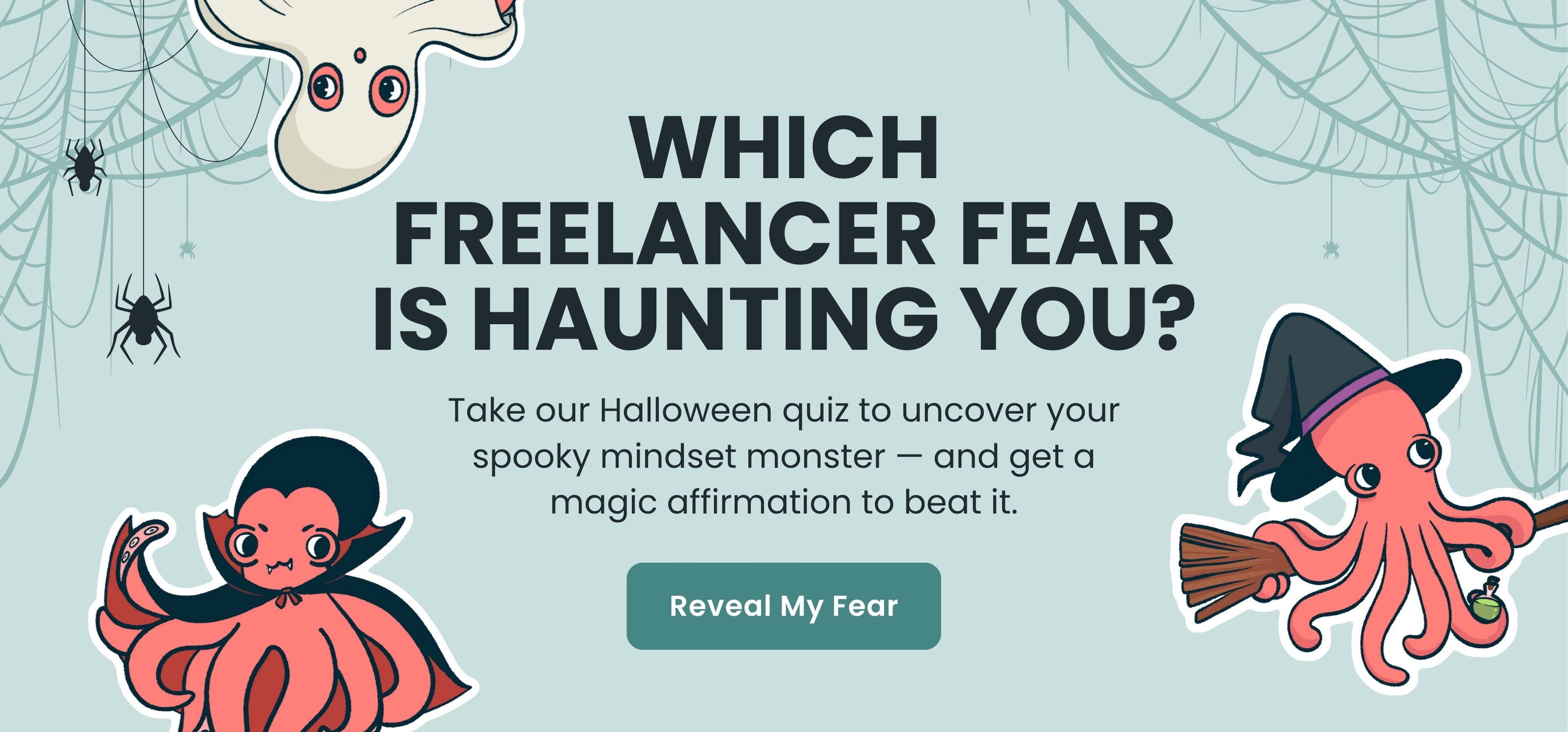ARE YOU AFRAID OF SUCCESS?
Oct 14, 2025
Self-employment can be a very vulnerable thing. From finances to networking to the nagging feeling that you’re actually just two frightened children in one floor-length trenchcoat masquerading as professional, confronting fear is a daily order of business.
As much anxiety as it adds to our lives, most of us are pretty attached to our fear. At a certain level, it’s highly useful: it helps us consider all the possible outcomes of our choices, creates some guardrails, and reminds us to measure risk before taking action. When left unchecked and unexamined, however, fear can quickly outgrow ambition.
For most freelance creatives, the ultimate worst-case scenario isn’t simply bad feedback or winding up in the red — it’s the possibility of giving something your best effort and still coming up short. The prospect of your best not being good enough is so scary, it’s not unusual to catch yourself fighting it by holding back, hedging your bets, and avoiding certain opportunities altogether.
In the spirit of Halloween, we’re unmasking the boogeyman that is self-sabotage — and noticing all the ways it shows up and makes it harder to grow, experiment, swing for the fences, and let our authentic selves show in our work.
Haunted by Scarcity?
Sometimes your fear has good intentions. Intrusive thoughts about what might happen if you don’t pursue enough leads or commit to enough projects are helpful when they keep you focused, but they often overstay their welcome. When this happens, the line between “the business you want” and “the business that’s technically serviceable” gets blurry.
When you’re preoccupied with worries about not having enough, it’s impossible to reach for more. A scarcity mindset gets in between you and your dream business by diverting all of your energy to clinging to the status quo, even when it’s no longer serving you.
If letting go of the opportunities you don’t want so they can be backfilled by ones that you do want feels like a pipedream, that’s the self-sabotage goblin whispering in your ear. He likes to pretend that there’s no viable middle ground between staying the course and firing all of your clients to pursue a midlife career in marine biology. Don’t listen to him.
Plagued by Guilt?
We all have this abstract sense of “growth” as a positive thing, but it’s not abnormal to be quietly (even subconsciously) conflicted about it.
When the opportunities you already have in the works are admittedly adequate, it can feel somehow wrong to want more flexibility, more money, or higher-profile projects. After all, what entitles you to any of those things when there are other people in your network struggling right in front of you to attract enough leads or maintain a healthy work-life balance?
Most of us grew up with mixed messages around success. On the one hand, it’s important to always try your best, but on the other, you’re supposed to keep things fair, never show off, and make sure everyone gets a turn. When you carry all those ideas into business, it’s easy to see how outwardly striving and aspiring can make you feel kind of… bad.
When self-sabotage tries to Trojan Horse itself in using your sense of guilt, it’s important to remember that pursuing your own interests while supporting others’ is not, and has never been, mutually exclusive. Pursue the leads that are right for you and pay the rest forward. Be the person who matches unusable opportunities to others in your network, and everyone benefits from your ambition.
Lingering Limiting Beliefs?
Not everyone pursues self-employment to see how big a business they can build (in fact, we’d wager that most of us don’t). It’s one thing to choose to keep your business at a size that suits your goals and lifestyle, but it’s another to back away from growth opportunities because you’re unsure of your ability to navigate them.
It’s true that growth adds complexity to your operational needs and administrative requirements, but that in and of itself is no reason to think small. Your inner self-saboteur is quick to forget how much you already “figured out” in order to get to where you currently are. This shows up as nasty internal thoughts about how it’s pointless to extend yourself when the stress and logistics of success would ultimately be too much for you.
What this fallacy totally ignores is the power of your network. Growth doesn’t require you to become your own bookkeeper, tax expert, or team of subcontractors — you’ve got people for that. Lean on your colleagues, and it’s entirely possible to take on more, bigger projects without losing focus on your own area of expertise.
Spooked by Money?
Most of us have a (at least) somewhat complicated relationship with money. When you’re first starting out as a solopreneur, watching yourself get paid to use your talents outside of a traditional employment situation almost feels like some kind of alchemy.
Your initial success should build up your confidence, but sometimes, it feels more like a delicate miracle you’re afraid to mess up. If you think of money as something inherently elusive, or like something that’s not really meant for you, no matter how much you have, it won’t be enough.
It’s shockingly common to peel back the layers on your relationship with money and discover that you assume that it’s something that’s supposed to be exchanged for suffering. Under that theory, work that’s well-paid must be tedious and stressful, and work that’s fulfilling and enjoyable can’t pay the bills. Sound familiar?
An unexamined money mindset keeps you from getting where you want to go by pushing you to prioritize predictable outcomes over good opportunities. When you’re frantically scrambling to scoop up scraps, it’s very easy to miss out on the projects and connections that will meet your needs in a way that actually feels good.
Frightened by Failure?
Like an esoteric couple’s costume, the fear of failure and the fear of success make the most sense when you see them together. The knot in your stomach you feel at the thought What if this doesn’t work out? is second only to What if it does?
It might be too ludicrous to acknowledge outright, but if we search ourselves, most of us can think of a time where we decided not to put our very best ideas into a proposal or pour our entire selves into a design simply in the interest of leaving ourselves somewhere to go if we got rejected.
Not only does this way of thinking block access to the opportunities you really covet, but it also gets you more of the kind you don’t want. No one sets out to work with organizations and people who are drawn to the watered-down versions of ourselves and our creative products. No one prides themselves on being all things to all people, so it therefore follows that the clients and projects you don’t get weren’t really meant for you.
When the insidious gremlin of self-sabotage tells you to aim for the middle, fight back with authenticity, even when it feels vulnerable. The only way to get better at failure is by failing. With enough practice, professional rejections start to feel less like deep personal wounds and more like simple differences in vision or timing — and the more willing you are to allow them to happen, the faster you’ll find your ideal projects.
The self-sabotage gremlin hates that.



